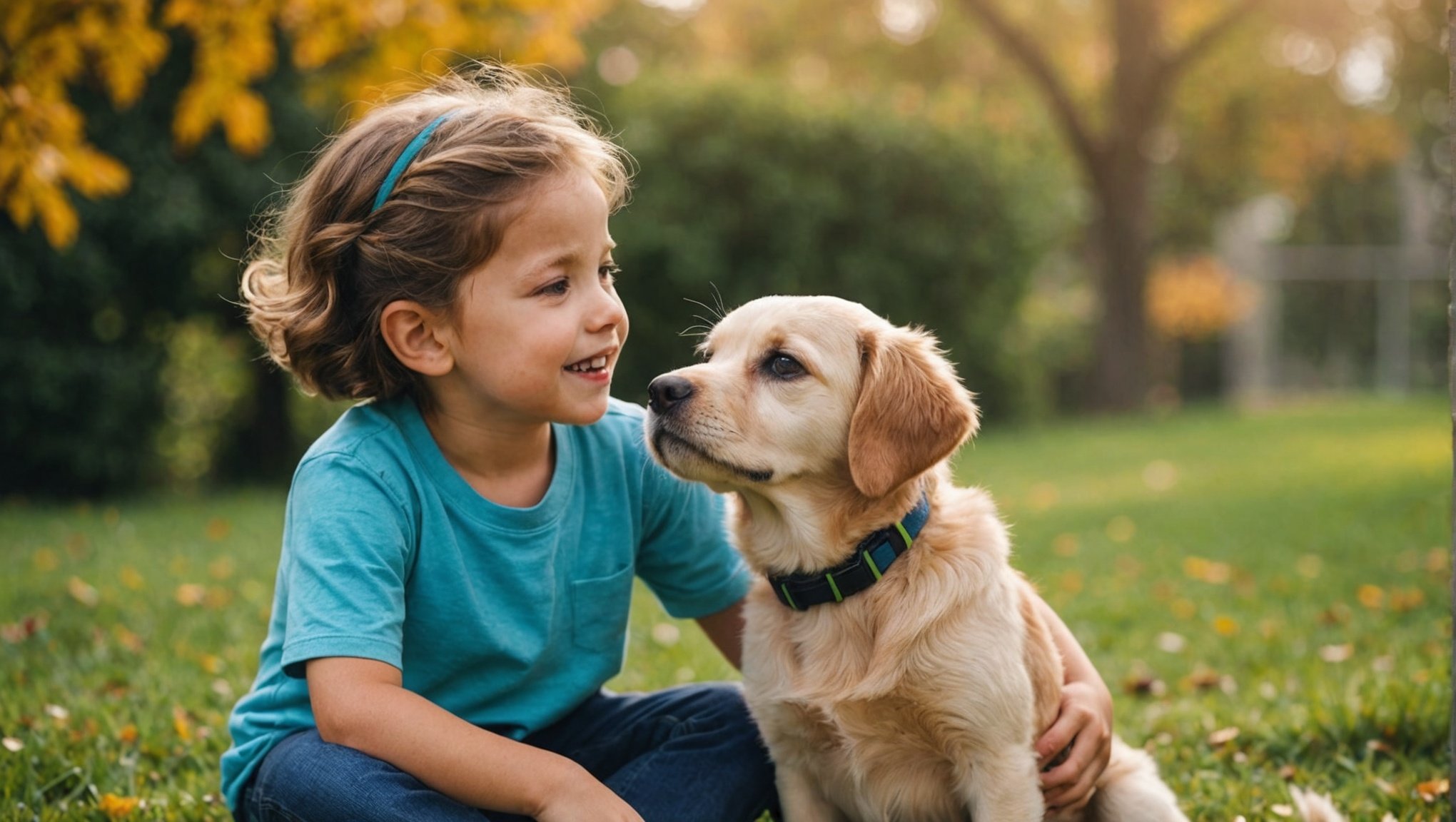Today’s society is increasingly aware of the importance of mental health. It’s no secret that anxiety disorders are on the rise, particularly among our younger generation. With the advent of technology and the rise of the internet, children today face a plethora of challenges that can be overwhelming, causing a great deal of stress and anxiety. It’s in this context that we turn our attention to the potential of pet dogs in alleviating anxiety disorders among children. How exactly can man’s best friend provide such solace and support? Let’s explore.
The Therapeutic Role of Pets
The therapeutic value of pets, dogs in particular, has been a subject of numerous studies. Ownership of pets, according to research, has shown significant impact on an individual’s physical, social, and mental well-being.
Also read : Does a Diet Rich in Omega-6 Fatty Acids Exacerbate Inflammation in Arthritis Patients?
A thorough review of the existing literature on this subject, accessible through platforms like Google Scholar and CrossRef, reveals some compelling findings. Pets can act as a source of comfort, providing emotional support and companionship. They can also give their owners a sense of responsibility and purpose, often encouraging regular physical activity and social interaction.
A study published in the Journal of Personality and Social Psychology found that pet owners had greater self-esteem, were more physically fit, and were less lonely than non-owners. Furthermore, pet owners were found to be more socially outgoing and had healthier relationship styles (less fearful attachment and less preoccupied attachment) than non-owners.
Additional reading : Transform your life with a dubai eating disorder counsellor
Dogs as Stress-Reducers
Dogs, in particular, have been found to offer unique health benefits to their owners. They not only act as companions but also as stress-reducers. Research has shown that interaction with dogs can lower blood pressure and reduce levels of the stress hormone cortisol.
A 2017 study published in the journal AERA Open, an open-access journal published by the American Educational Research Association, found that pet dogs provide socio-emotional benefits for all children, not just those with anxiety issues. The study found that having a pet dog in the home was associated with a decreased probability of childhood anxiety.
In this sense, the adoption of a pet dog can be seen as an adjunctive therapy for children suffering from anxiety disorders. The everyday responsibilities that come with caring for a dog, such as feeding and walking, can provide a sense of structure and routine, reducing feelings of uncertainty and anxiety.
Animal-Assisted Therapy
Animal-assisted therapy is another area where dogs are proving to be beneficial. This form of therapy involves bringing animals into a therapeutic setting to help individuals cope with their health problems. It’s been used in various contexts, such as hospitals, nursing homes, and schools.
Research has shown that therapy dogs can help children learn social skills, improve their self-esteem, and reduce their anxiety levels. A 2015 study published in the Journal of Pediatric Nursing found that interaction with a therapy dog decreased distress and anxiety in children undergoing medical procedures.
Schools are also recognizing the benefits of therapy dogs. Some are even introducing “therapy dog programs” in which dogs are brought into the classroom to provide comfort and support to students. Such programs have shown to improve students’ attitudes towards school and decrease their stress levels.
The Dog-Owner Bond
The bond between a dog and its owner is a special one. Research has shown that this bond can lead to a variety of health benefits. For children with anxiety disorders, this bond can provide a strong source of comfort and security.
When it comes to the dog-owner bond, it’s not just about the companionship provided by the dog. It’s also about the sense of purpose and responsibility that comes with caring for another living being. This can help children with anxiety disorders by providing them with a sense of control and predictability.
In conclusion, there’s considerable evidence to suggest that adopting a pet dog can help alleviate anxiety disorders in children. Whether it’s through the companionship they offer, the responsibilities they impart, or the unconditional love they provide, dogs can make a significant difference in a child’s life.
The Impact of Pet Dogs on Children’s Physical Activity
Physical activity and outdoor play play a crucial role in the overall health and development of children. Regular physical activity is not just beneficial for physical health but also aids in reducing anxiety levels. The link between owning a pet dog and increased physical activity in children is supported by numerous studies available on Google Scholar, CrossRef Google, and PubMed CrossRef.
Children with pet dogs are often more active, partaking in regular walks and playtime with their pets. This active engagement, in turn, contributes to their overall physical health, reducing the risk of obesity and promoting cardiovascular health. But it is also very beneficial for their mental health. The physical activity associated with dog ownership serves as a natural stress response, helping to reduce anxiety levels and improve mood.
A study published in the American Journal of Public Health found that children with dogs spent more time doing physical activity and were less likely to be overweight. Another study published in the Journal of Physical Activity and Health found that children with dogs spent more time engaging in physical activity and less time being sedentary.
The predictability of a dog’s need for exercise provides a routine that can be comforting to children who suffer from anxiety. Regular walks or playing catch in the park with their pet dog can help children feel more in control and less anxious.
Dogs as Providers of Social Support
Pets, specifically dogs, also offer essential social support to children, especially those dealing with anxiety disorders. The companionship of a pet dog can be a significant source of social support, providing a sense of belonging and acceptance that is often lacking in children with anxiety disorders. This is particularly true for children who struggle with social interaction.
Dogs provide nonjudgmental and unconditional love, which can significantly improve a child’s self-esteem. These animals can act as social buffers, making children feel less anxious in social situations. The tangible presence of a pet dog can give a child a sense of security, reducing their stress response in social settings.
A study published in the Journal of Clinical Child and Adolescent Psychology found that having a dog as a pet was associated with a lower likelihood of social anxiety in children. Similarly, a study in the Journal of Abnormal Child Psychology found that adolescents who owned pets had lower anxiety and depression levels.
Conclusion
The importance of mental health is well recognized in today’s society. As anxiety disorders among children continue to rise, the adoption of pet dogs presents a potential solution. From their role as a source of comfort and emotional support to their ability to promote physical activity and provide social support, pet dogs can indeed help alleviate anxiety disorders in children.
Whether it’s through animal-assisted therapy or the bond that children form with their pet dogs, these animals can make a significant difference in a child’s life. The sense of purpose and responsibility that comes with dog ownership can provide children with a sense of control and predictability, key elements in managing anxiety disorders.
In the light of comprehensive studies and research available on platforms like Google Scholar, the therapeutic role of dogs cannot be overlooked. The adoption of a pet dog can serve as an effective adjunct to traditional anxiety treatments, providing children with a constant source of comfort, companionship and unconditional love. It’s indeed time we gave man’s best friend the recognition it deserves for its potential role in improving children’s mental health.











